Business & Development
Giulietta Pinna’s Prop Up Shop is Where Business and Wonder Mix
With her prop rental shop and photo studio, Pinna turned hoarding vintage items into a career.
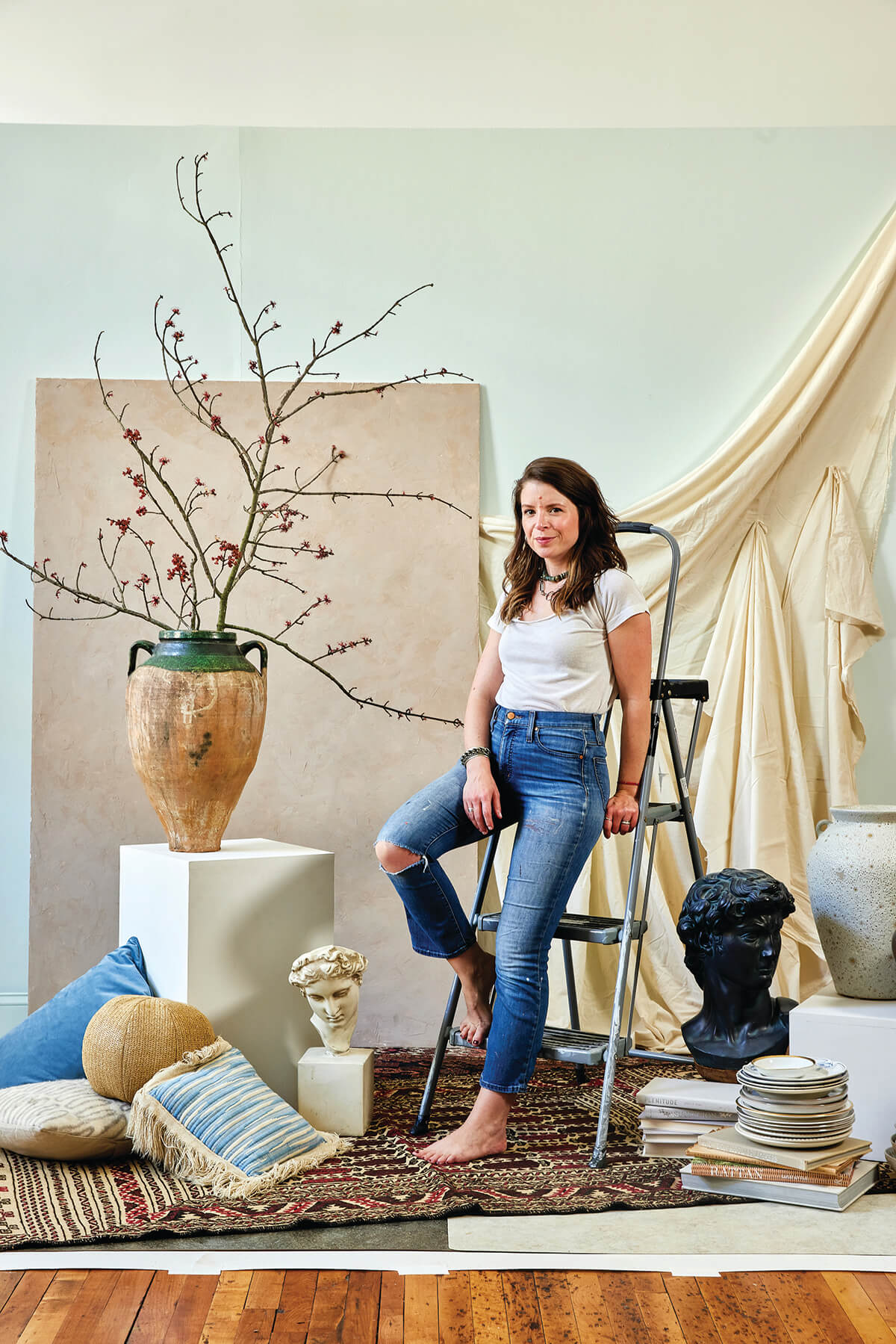
Giulietta Pinna’s eyes scan the shelves at Prop Up Shop, her prop rental house in Baltimore. There’s lots to see, including stacks and stacks of plates and bowls in every color, from vermillion to celadon; bundles of silverware; rows of glasses, vases, trinkets, and candy dishes; and an entire section devoted to teapots. There are wooden blocks, and gemstones, clocks, vintage electronics, and a section labeled “science collection.”
In all, thousands of items are available for weekly rentals at this niche booming business in Baltimore.
Pinna, 37, who also works as an art director and prop and set stylist, has the captivating allure of Audrey Hepburn mixed with the gumption and pluckiness of Hermione Granger. It turns out that’s the perfect combination for someone who has turned hoarding into a career.
Her maternal grandparents immigrated to Baltimore from Italy before opening Alberto’s, a barbershop in Highlandtown. Her father, Enzo, who also immigrated from Italy, owns an Italian food distribution company.
“I came from this lineage of seeing my family members move to a different country and start their own businesses—that always really inspired me,” Pinna says.
It was hard to see that path clearly when she was in her childhood. Her parents moved their family from Baltimore to Fallston in 1982.
“The highlight of our town was that there was a Chili’s in nearby Bel Air and the Harford mall,” she laughs. “It was super rural.”
But a trip to New York City when she was 12 awakened the idea there was life beyond her small town. She was smitten with how different it felt from her daily life. And everything—the food, the buildings, the people—excited her. She figured her ticket back to Manhattan was college.
“My favorite classes were always art classes. I was never like a super amazing student in high school—just like a B average,” she says. But she spent her days sketching and poring through magazines looking for inspiration. She was accepted to the Fashion Institute of Technology and headed there after graduating from Fallston High School in 2004.
Pinna told the registrar at the school her ultimate goal was to work at Seventeen magazine and do their photo shoots. But styling wasn’t a professional track then, so instead they pushed her to become an advertising, marketing, and communications major.
While at FIT, Pinna reconnected with Nate Bachmann, an old friend from school. The two first met when they were 15 in biology class. They dated for a little bit in high school, but Pinna broke up with him, convinced she was going to New York to live the “Friends lifestyle and probably meet a guy at a bar or something,” she laughs.
Bachmann licked his wounds and headed off to the Rochester Institute of Technology to study graphic design. But after going on loads of MySpace dates, a light bulb went off in the back of Pinna’s head and she realized she was in love with Bachmann. The summer after her sophomore year, they were both home working and got back together.
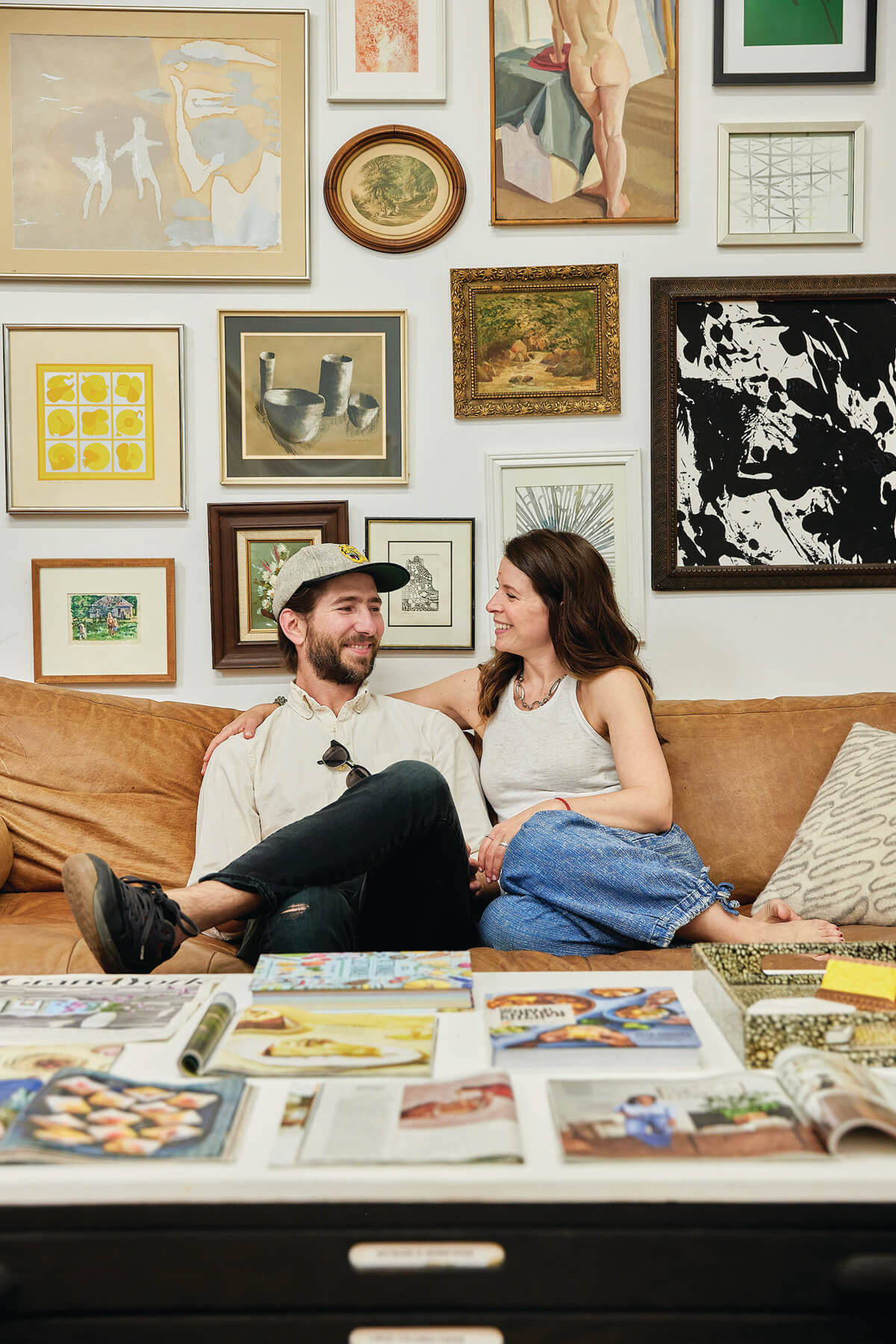
And while that relationship made sense, her concentration at FIT wasn’t feeling like the right fit. After several internships in public relations—which she hated—Pinna knew she needed something more creative and stayed at FIT for two extra years to get another bachelor’s degree in fine art management. (“Which is, like, so stupid. Why does anybody need another bachelor’s degree?” she cracks.)
But that second degree kick-started a career in the world of blue-chip galleries—the most high-end of art galleries. For almost seven years, Pinna was dealing with multi-million-dollar artwork as an executive assistant and studio manager. She thought she’d be in New York forever. But after she and Bachmann were married in 2013, “we really started thinking about doing more adult things, like buying a house or an apartment”—something that was unrealistic in New York’s sky-high real estate market.
“I was scared to leave New York City because I felt so rooted there,” admits Pinna. She had never imagined a life back in Maryland. “I have to say, and I’m going to be honest, Baltimore was never actually my first choice.” But the proximity to family and the affordable housing market sealed the deal and the two arrived in 2014 ready for a change.
For Pinna that meant leaving the world of art galleries and figuring out a new career path. Before leaving Manhattan, she had enrolled at the International Culinary Center for a level-two sommelier certification and landed a job with a wholesale wine and spirit distributor in Maryland. But instead of spending her day discussing tannins and bouquets, she was “working in dirty liquor store basements, literally counting bottles,” says Pinna. She was on the road constantly and worked every holiday. She had gone from a dream job in her dream city to crying every day before work.
Bachmann finally convinced her to quit. They had enough money squirreled away that she was able to take four months to “refine myself and kind of get myself out of the mental sludge that I was in,” she says. She started painting again. She started drawing again. And she started to wonder what would make her happy again.
“I just kept thinking about the ‘when life gives you lemons’ thing,” says Pinna. “I really did feel like my life had taken a turn and it had kind of gone sour. And then part of me was like, ‘Oh, well, maybe I’ll start this business called Limonata’—which is lemonade in Italian. And I’ll start turning my lemonade into something sweet.”
Her new venture, Limonata Creative, which she launched in 2016, offered three services—event design, photography styling, and graphic design. She hired photographer Tom McCorkle—whom she had met serendipitously at Highlandtown’s Y:Art Gallery, where she took a part-time job during her sabbatical—to take images for her website. They still work together.
After her first year in business, she knew that photography styling was what made her the most excited. “My heartstrings just kept pulling me here,” says Pinna. And she was really good at it.
“I REALLY DON’T THINK I COULD HAVE DONE THIS IN ANY OTHER CITY, WHICH IS KIND OF THE BEAUTY ABOUT IT.”
Pinna has always been an accumulator of stuff. “I love to collect, and I’ve been collecting all my life.” But she also loved the possibility that comes with creating. She would paint surfaces and source items from flea markets and antique shops. “I could make this vision that doesn’t exist otherwise come to life,” she says.
All these items started accumulating in the basement of her Canton rowhouse. And soon other stylists were showing up to borrow items for their own shoots. Every time prop and wardrobe stylist Danielle Wood, one of her first clients, would come over, Pinna would apologize for the mess. “But it was already very shoppable,” says Wood. Pinna objects, “But if you took one thing off the shelf, it was perilous.”
Soon the props Pinna had amassed couldn’t fit in her basement anymore. A prop shop didn’t exist in Baltimore. And despite an internal voice sounding the alarm—“if it doesn’t exist, it’s because the need isn’t there”—she forged ahead and rented a space at 3500 Parkdale Avenue in Woodberry in 2021, calling it the Prop Up Shop.
“I was like, this is an opportunity to show people what it is and maybe start something. You never know,” she says.
The added bonus of the prop shop was that while styling is often done in a silo away from other stylists, this space was creating a community. For Wood, who would often rent items sight unseen from prop shops in Brooklyn, the opportunity to see everything in person, touch it, and get a sense of its scale was huge. “It’s very, very helpful,” she says.
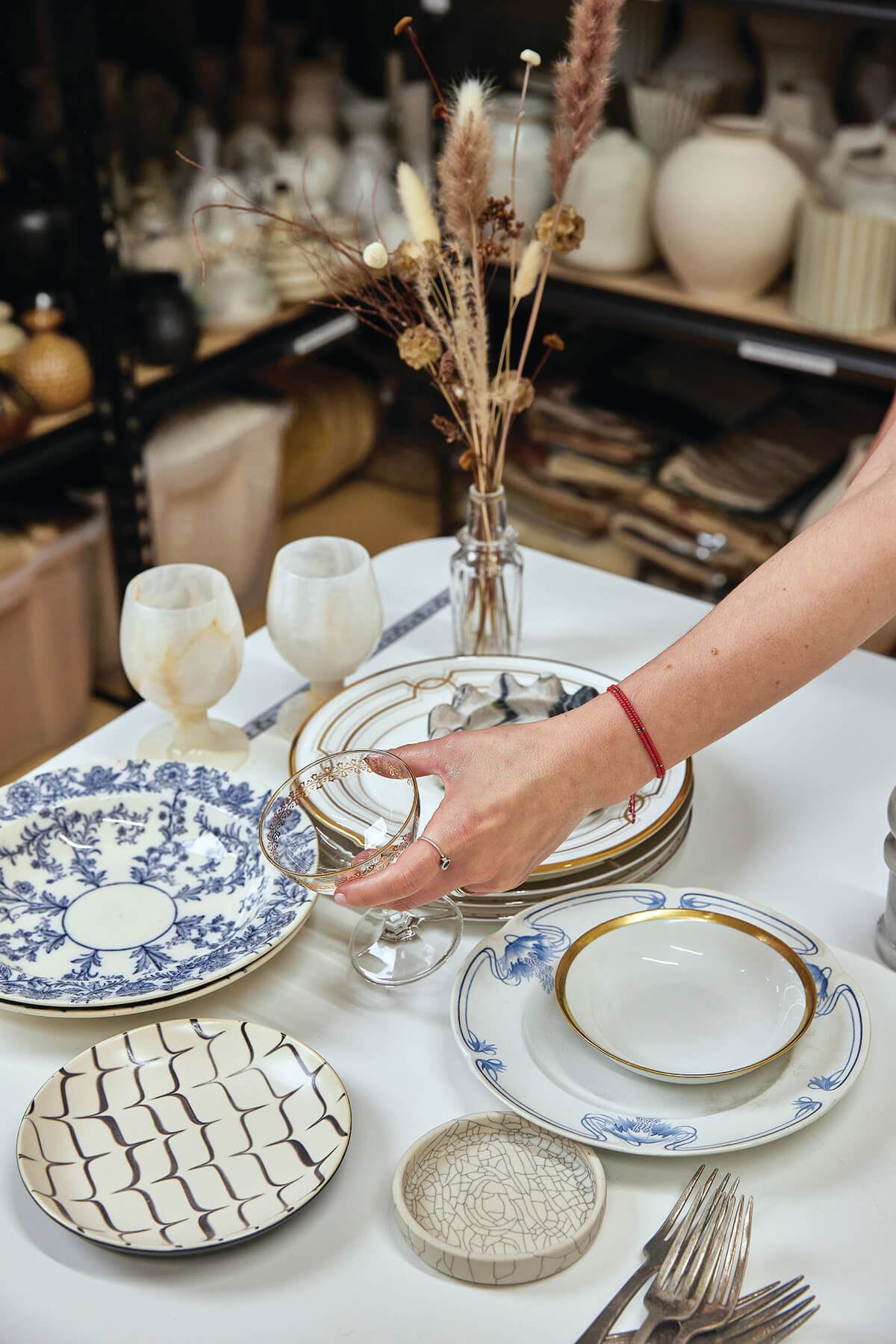
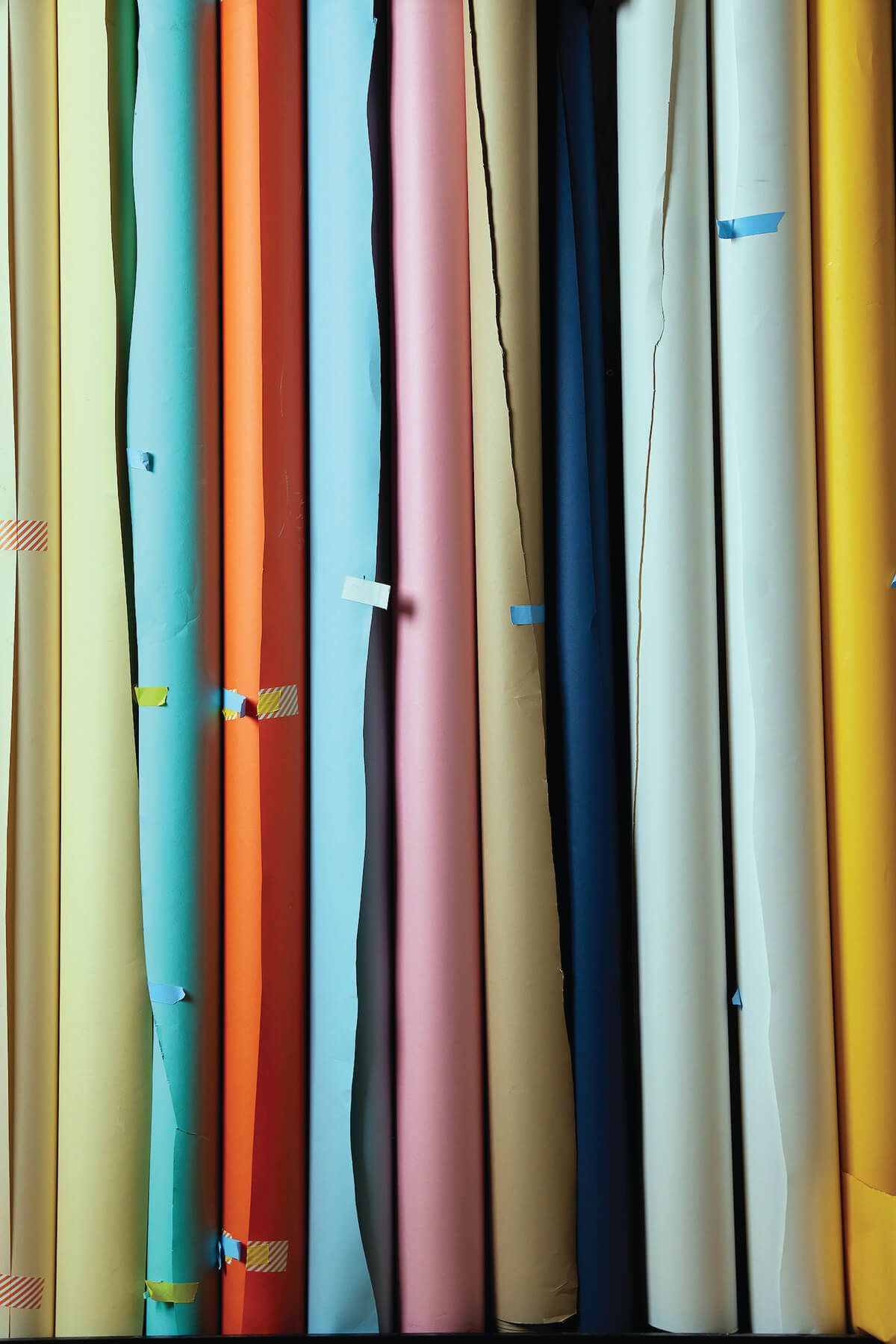
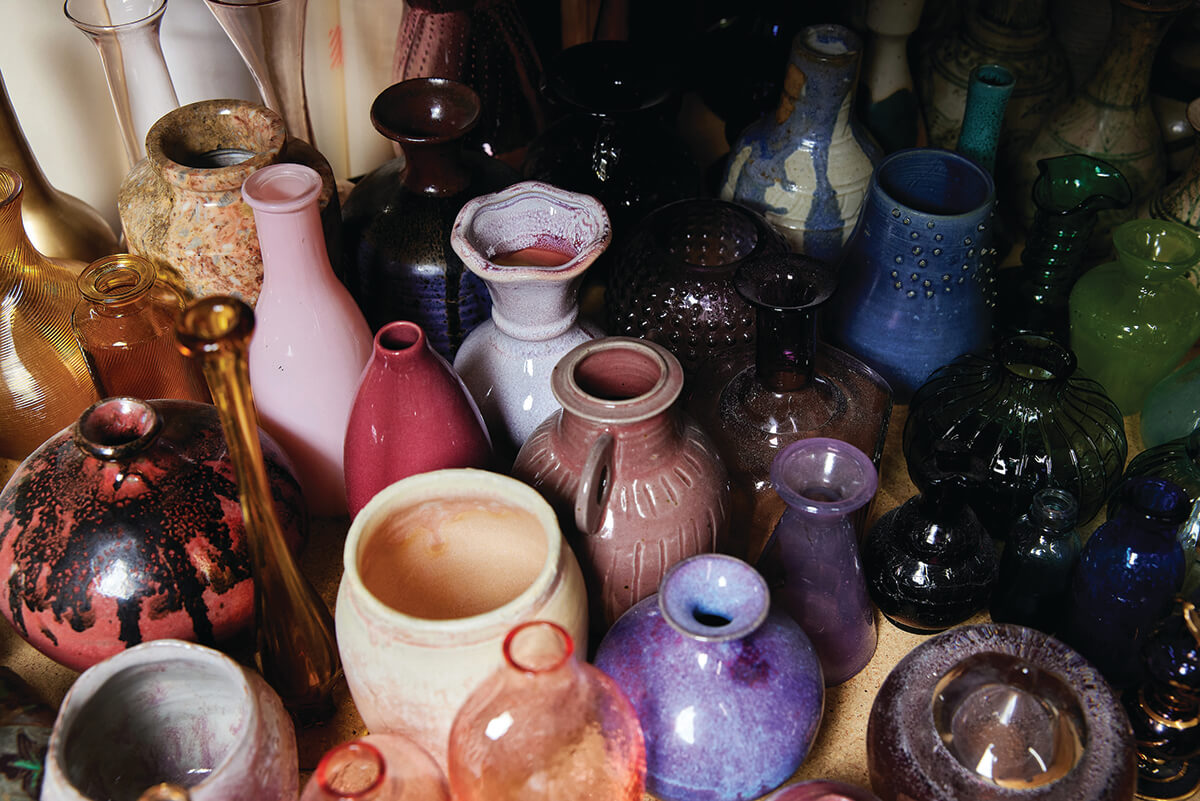
The first space had 10 racks full of props and about 20 custom surfaces, a big component for creating an environment for shooting. Pinna’s collection includes hand-painted panels, wood, marble, metal, tile, vinyl, and seamless and fabric backdrops.
And then, as Pinna and Bachmann had done before, they decided to choose disruption. They sold their Canton house and most of their furniture, moved into Pinna’s parents’ home, and then headed out in January 2022 to spend six months traveling the world. The idea was to spend about a month in each country.
“We didn’t want to be somewhere new each week,” says Pinna. “We really wanted to feel like we’re leaving roots and try to understand the country—learn about the culture, learn about the art, and give me time to source things.” Pinna shopped in every country, shipping items back to the Prop Up Shop from Mexico, Colombia, Peru, Thailand, Vietnam, Indonesia, and Turkey.
They didn’t realize what it would be like to only be with each other every single hour of every single day for months on end. “We learned so much about ourselves in this six-month period of time, I think more than any other time in my life,” says Pinna. There was also a lot of introspection about their marriage and their future.
After some emotionally fraught conversations, they took a week apart in Vietnam and then came back together, both wanting to make everything work. “We’re going through this really intense period full of joy and adventure, right? But it was really hard on our marriage,” Pinna says.
In the end, though, they were both really glad that it happened. When they got home, they moved the studio down the hall into a bigger space. Bachmann, who had left his job as a graphic designer for the trip, came on to the Prop Up Shop/Limonata Creative staff full-time and they hired photographer Emily Schultz to manage the studio, which now includes over 100 surfaces and backdrops and so many props Schultz hasn’t finished cataloguing them all yet.
The new space also houses a small photo studio that Pinna and Schultz use and rent out.
It was a whirlwind. “And instead of being in a foreign country, we’re like, back in a room at my parents’ house,” she laughs. (The two are now renovating an original Sears-Roebuck Catalogue Foursquare home, built in 1902 and nestled in the Riderwood community.)
Pinna’s days are busy. She’s styled cookbooks, including José Andrés’ The World Central Kitchen Cookbook: Feeding Humanity, Feeding Hope; been a prop stylist for Real Simple, Better Homes & Gardens, Southern Living, The Washington Post, McCormick, and countless interior designers; and just signed on with the national talent agency, Big Leo Productions. Next up, working with Sally McKenney, of the popular Sally’s Baking Addiction blog, on her second cookbook.
“Giulietta represents in action the ethos of what our collective Baltimore design community is—innovative, collaborative, and caring,” says Shawn Chopra, founder and creative director of Good Neighbor Shop and its design garage. “Prop Up Shop is her beautiful gift to us.”
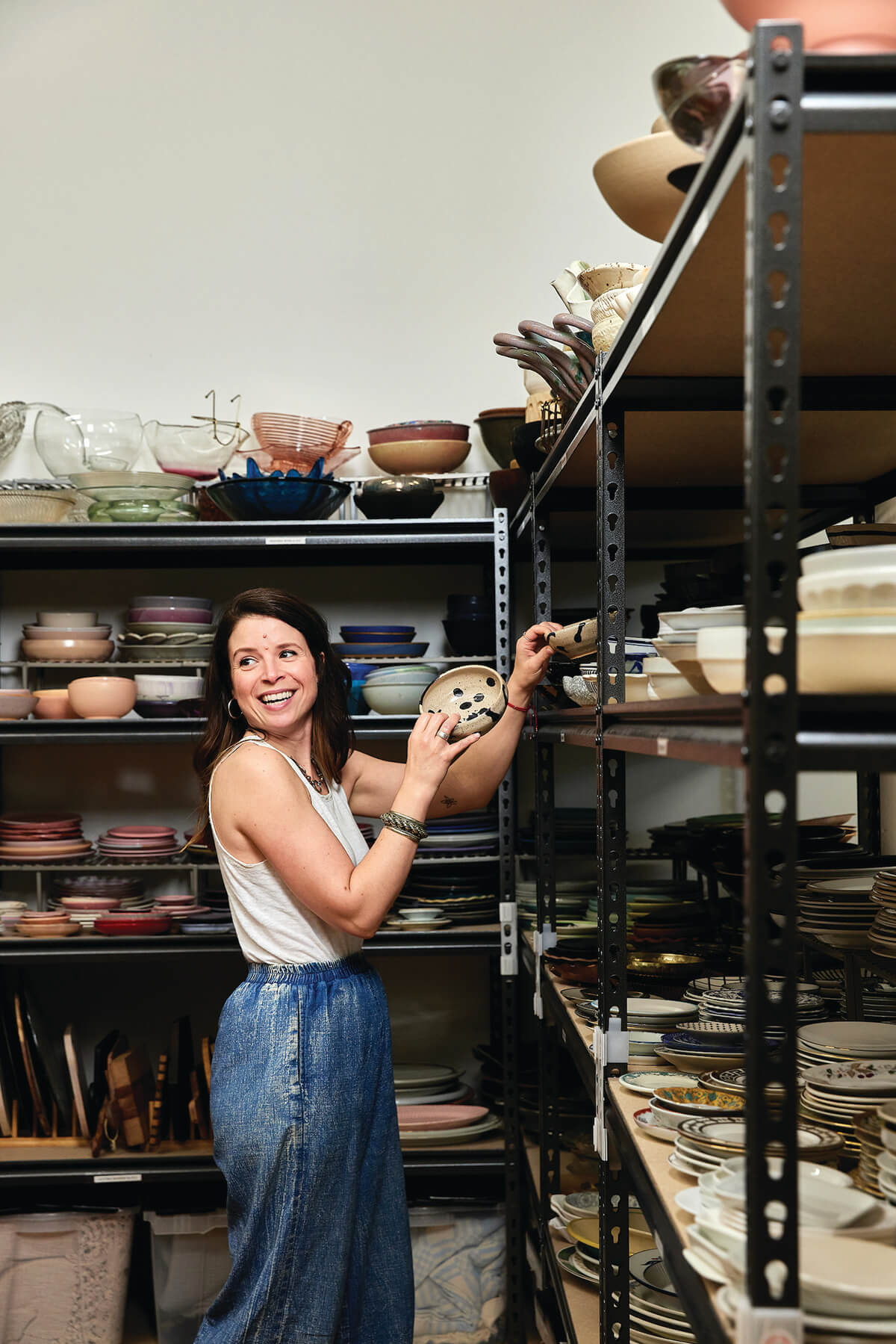
And don’t be fooled by her girl-next-door persona. Pinna—always dressed in her uniform of jeans and a black or white tee—is a proficient and skillful business owner. Which means she’s always on the hunt for more props.
“Every project does kind of require something new, even if maybe it’s one or two things or 20 things. So more often than not, I am buying new things weekly,” says Pinna. “And then sometimes if we’re on vacation or we have a day off, I’m like, ‘Let’s go to the thrift store,’ and I’ll find a couple things. Because nothing gives me more joy than a good thrift.”
She also notes that many times people will try and pawn unwanted stuff off on her. Maybe an old set of wedding china or a vintage couch. “I’m like the new Goodwill in town,” she jokes. But she often says no. Her collection is curated and deliberate.
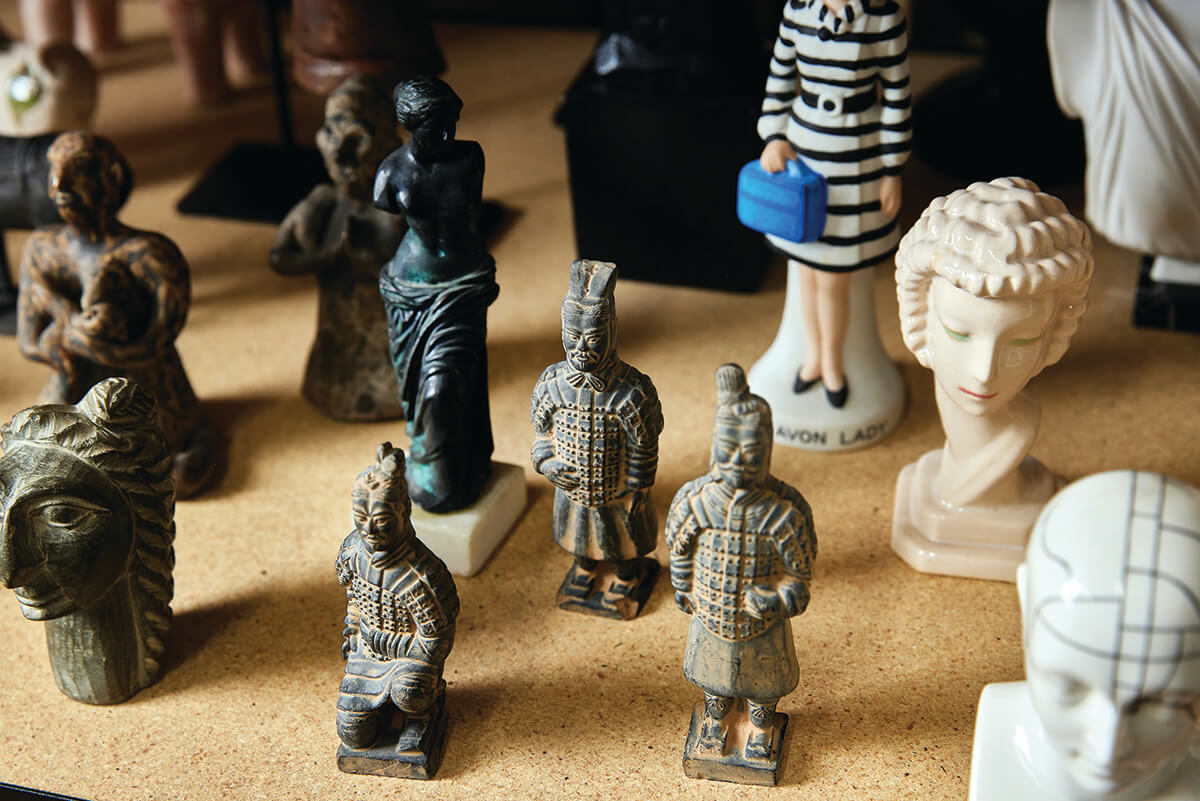
Her studio wares are also an encapsulation of the world but with a Baltimore ZIP code. She is so appreciative of what this city, a place she never wanted to return to, has offered.
“I really don’t think I could have done this in any other city, which is kind of the beauty about it,” she says. “Baltimore provides opportunities for creatives to flourish.”
When she first started Limonata Creative, her mother-in-law, who knew Pinna was suffering from low confidence, bought her a few sessions with a business coach. Pinna truthfully told the woman, “I just have no experience. Who am I to do this?” Her imposter syndrome was off the charts. But the woman stopped her. “She’s like, ‘What are you talking about? You’ve been studying since the minute you held a magazine in your hand.’”
Pinna had never considered that. “Ever since I was a kid, I was looking at publications, looking at advertisements, looking at film, looking at arts, and trying to process compositions and colors and moods and aesthetics,” says Pinna. “That woman was right. I’ve been studying for a long time.”
She has finally landed in a place where her confidence and ability have coalesced. And for now, that means expanding both sides of her business, making plans to move into their home this summer, and being at peace with the ordinary.
“A big thing we learned on our travels is you don’t need much to be happy,” says Pinna. “And that success can mean so many different things to so many different people.”
She knows big things lay ahead, but her happiness needs to be factored into all her decisions.
“If it’s not enjoyable, then what’s the point?” she says. “What I learned through all the jobs that I hated, when I was crying every day, is if I have to be here and I have to work, then shouldn’t I be enjoying it?”